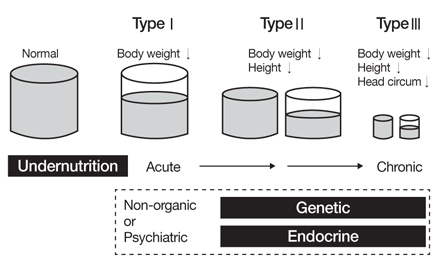J Korean Med Assoc.
2012 Aug;55(8):770-776. 10.5124/jkma.2012.55.8.770.
Clinical approaches to failure to thrive of infants and toddlers: a new paradigm
- Affiliations
-
- 1Department of Pediatrics, Keimyung University School of Medicine, Daegu, Korea. pedgi@kmu.ac.kr
- KMID: 1435183
- DOI: http://doi.org/10.5124/jkma.2012.55.8.770
Abstract
- Failure to thrive (FTT) is a term used to describe growth failure in infants and toddlers. The three categories of FTT are based on anthropometric measurements of weight, length, and head circumference for age. Type 1 FTT is the failure to gain weight due mainly to inadequate nutrition. Type 2 FTT is a clinical condition associated with short stature induced by endocrine or genetic factors. Type 3 FTT results from chromosome anomalies or central nervous system abnormalities. Pediatric endocrinologists may be involved in treating patients with short stature of type 2 FTT. Pediatric gastroenterologists may be interested in patients with malnutrition of type 1 FTT, and pediatric psychologists may play a major roll in treating those with non-organic FTT or feeding disorders. This review introduces a new paradigm of clinical approaches to FTT in infants and toddlers to emphasize the importance of multidisciplinary clinical approaches to FTT.
Keyword
Figure
Reference
-
1. Hwang JB. A clinical approach to failure to gain weight in infants. Korean J Pediatr. 2004. 47:355–361.2. Bergman P, Graham J. An approach to "failure to thrive". Aust Fam Physician. 2005. 34:725–729.3. Olsen EM. Failure to thrive: still a problem of definition. Clin Pediatr (Phila). 2006. 45:1–6.
Article4. Schwartz ID. Failure to thrive: an old nemesis in the new millennium. Pediatr Rev. 2000. 21:257–264.
Article5. Lee BC, Kim HR, Sohn CL, Kam S, Hwang JB. Clinical outcomes of infants with failure to gain weight among out-patients. Korean J Pediatr. 2004. 47:604–610.6. Daniel M, Kleis L, Cemeroglu AP. Etiology of failure to thrive in infants and toddlers referred to a pediatric endocrinology outpatient clinic. Clin Pediatr (Phila). 2008. 47:762–765.
Article7. Careaga MG, Kerner JA Jr. A gastroenterologist's approach to failure to thrive. Pediatr Ann. 2000. 29:558–567.
Article8. Kim JE. Korean Society of Pediatric Gastroenterology, Hepatology and Nutrition Society. Clinical approaches to feeding disorders in infants and young children. Proceedings of the 4th Symposium of Nutrition of Child and Adolescence. 2010. 2010 Mar 21; Seoul, Korea. Seongnam: Korean Society of Pediatric Gastroenterology, Hepatology and Nutrition Society;68–77.9. Chatoor I, Ganiban J, Surles J, Doussard-Roosevelt J. Physiological regulation and infantile anorexia: a pilot study. J Am Acad Child Adolesc Psychiatry. 2004. 43:1019–1025.
Article10. Kim JE. Korean Society of Pediatric Gastroenterology, Hepatology and Nutrition Society. Diagnostic and therapeutic approaches of nonorganic failure to thrive. Proceedings of the 6th Symposium of Nutrition of Child and Adolescence. 2012. 2012 Mar 18; Seoul, Korea. Seongnam: Korean Society of Pediatric Gastroenterology, Hepatology and Nutrition Society;51–58.
- Full Text Links
- Actions
-
Cited
- CITED
-
- Close
- Share
- Similar articles
-
- A Clinical Approach to Failure to Gain Weight in Infants
- A Clinical Observation on Failure to Thrive
- Transient Pseudohypoaldosteronism in a 5-Month-old Infant Manifested as a Failure to Thrive
- Nutritional Management of Failure to Thrive
- Clinical Characteristics of Failure to Thrive in Infant and Toddler: Organic vs. Nonorganic



